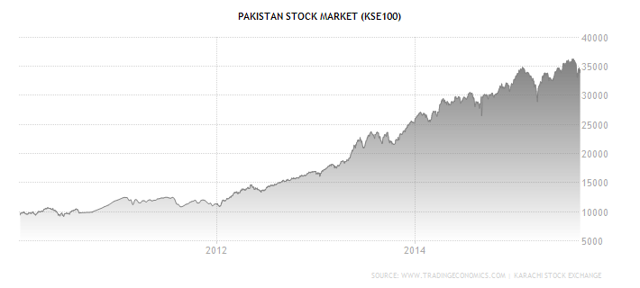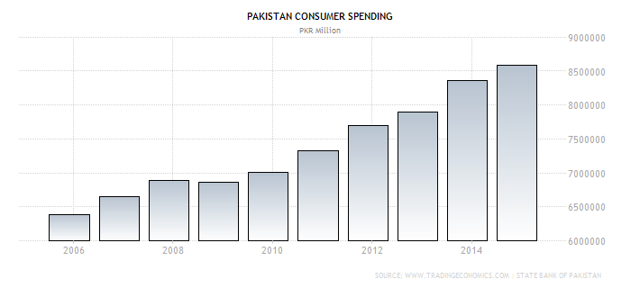Pakistan Stands Strong During Emerging Market Uncertainty
Economics / Pakistan Nov 22, 2015 - 03:19 PM GMTBy: Submissions
 Dylan Waller writes: China’s currency devaluation in August created an FX turmoil for a large number of countries in Asia, and with a potential Fed rate hike coming this December, it may be befitting to turn to overlooked areas in Asia to achieve a solid portfolio return. Despite the rapid growth of Pakistan’s economy and its stock exchange, it remains a relegated destination for investment, and a country that Asia based hedge funds consider to be too risky. The Karachi Stock Exchange has had a 1 year return of 13.95%, making it one of the best performing stock markets in Asia. Pakistan’s currency is another bright spot for the country, as it has only had a 4.9% YTD depreciation against the USD. With much of Asia suffering from high FX losses and less superior performing stock markets, Pakistan’s recent performance gives it a prestigious standing in Asia.
Dylan Waller writes: China’s currency devaluation in August created an FX turmoil for a large number of countries in Asia, and with a potential Fed rate hike coming this December, it may be befitting to turn to overlooked areas in Asia to achieve a solid portfolio return. Despite the rapid growth of Pakistan’s economy and its stock exchange, it remains a relegated destination for investment, and a country that Asia based hedge funds consider to be too risky. The Karachi Stock Exchange has had a 1 year return of 13.95%, making it one of the best performing stock markets in Asia. Pakistan’s currency is another bright spot for the country, as it has only had a 4.9% YTD depreciation against the USD. With much of Asia suffering from high FX losses and less superior performing stock markets, Pakistan’s recent performance gives it a prestigious standing in Asia.
Demographics are very favorable, and will also play a huge role in Pakistan’s continued growth, as nearly half of the country’s population is younger than 30. Pakistan’s consumption growth has also been impressive, and continued growth in consumption is projected. While the trends of growth are obvious in Pakistan, strategic industry approaches are necessary, in order to apply a successful value based investment approach to Pakistan’s stock market A glance at the KSE-100 Index provides a large level of discrepancies in valuation for listed equity in Pakistan. Investment into strategic industries in Pakistan provides ample upside potential, and should certainly considered a viable option for the Asian Hedge Fund Industry to consider.
Addressing Terrorism
Investors can remain confident for Pakistan to be a credible location for investment for the following two reason: terrorism from now until 2012 has not stopped the rapid economic growth in the country, and the Khyber Pakhtunkhwa Home Department released a report this year about the substantial decrease in terrorism in Pakistan. According to this report, there was a 64% decrease in incidents of terrorism, 83% decrease in suicide attacks, 50% decrease in target killing, and 77% decrease in kidnapping for ransom. The situation is clearly improving, and it is most impressive to to note the strong growth of the country’s economy and stock market that took place before this recent improvement.
Stock Market and Consumption Growth

The rapid gain of the Karachi Stock Index began in early 2012, and it is impressive to note that low valuation can still be found in certain industries, despite the fact that the index has done nothing but ascend rapidly since 2012. The Karachi Stock Exchange has had a 1 year return on 13.95%, implying that actively managed funds have the ability to perform better than this, after choosing strategic industries for investment, and conducting ample due diligence for individual companies. Pakistan should represent a small portion of Asian Hedge Fund’s portfolios, as the return for Asian Hedge Funds this year was only 5.78%.

Pakistan’s consumer spending has been consistently increasing since 2008, and a large number of listed equity in this industry can be found in Pakistan. However, the consumer products industry should be navigated very strategically, as the high growth has also created high valuation for some of the listed companies. Continued increased trends of consumption will continue to drive Pakistan’s economy, with the following levels of CAGR projected until 2019:
- 9.9% food consumption growth
- 3.1% soft drink sales growth
- 8.5% grocery retail sales growth
FDI from China
Moreover, new flows of FDI into Pakistan’s soon to be transition to an emerging market are clear signals of the strategic time it is to enter Pakistan for investment. China and Pakistan recently announced plans for a $45 billion economic corridor, which includes roads, ports, power plants, and dams. This FDI inflow, which is 18.6% of the country’s current GDP, will serve as a major economic catalyst for the country.
Value Investing
The cement industry and construction industries are two very strategic sites for investment in Pakistan, as they experienced growth of 57% and 11.3% respectively. There is still ample room for growth, and the key players that decide to move first will have ample upside potential. Lucky Cement, one of the key players in the cement industry, operates two plants in Pakistan, has a cement grinding facility in Iraq, and is also part of a venture that is planning to construct a cement plant in the Democratic Republic of Congo. Other successful companies in this industry in Pakistan have extremely low valuation, despite the rapid gain in stock price. DG Khan Cement’s P/E is currently 6.4, and the company’s stock price has increased by 57.2% in the past year. A value based investment approach to Pakistan’s banking industry can be applied, as the majority of Pakistan’s banks have single digit P/Es. Pakistan’s textile industry offers some opportunity for value investors, but faces the threat of comparatively lower wages in countries like Bangladesh and Vietnam. As with many countries, the low oil price environment has also created some value based investment opportunities, for those banking on a future rebound in oil prices. Historical financial performance during varying oil prices provides a reasonable indication of the company’s upside potential when oil prices recover. Hub Power Company, Pakistan’s largest independent power provider, can still be bought at very low valuation, despite its stock gaining 49% in the past 52 weeks. Value investing into strategic, high growth industries, coupled with due diligence of individual companies, provides the opportunity for record returns for Asian Hedge Funds. The top performing funds may very well be the ones that recognize the need to make Pakistan a part of their portfolio, as areas in Asia that were once bright are beginning to turn dark.
Dylan Waller is a Contributor for Seeking Alpha and Smartkarma, and a Macroeconomic Researcher for the crowdsourced consultancy Wikistrat. His research focuses on frontier and emerging markets, with a primary focus on the strategic advantages of Vietnam, Pakistan, India, The Philippines, and Mongolia.
Email: dylan@nomadicequity.com
Website: www.nomadicequity.com
Copyright © 2015 Dylan Waller - All Rights Reserved Disclaimer: The above is a matter of opinion provided for general information purposes only and is not intended as investment advice. Information and analysis above are derived from sources and utilising methods believed to be reliable, but we cannot accept responsibility for any losses you may incur as a result of this analysis. Individuals should consult with their personal financial advisors.
© 2005-2022 http://www.MarketOracle.co.uk - The Market Oracle is a FREE Daily Financial Markets Analysis & Forecasting online publication.



